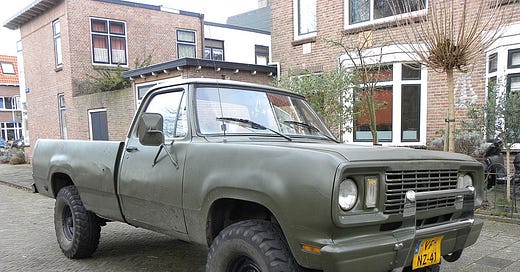Please help support my work by upgrading to a paid subscription or giving a gift subscription here:
I served in the U.S. Army from Feb. 1978 to Feb. 1982. The first three years were under Commander-in-Chief Jimmy Carter, who died Sunday at age 100, and the final year under Commander-in-Chief Ronald Reagan. I’ll tell you what it was like. The first year and a half were routine, boot camp, learning Russian for a year at the Defense Language Institute in beautiful Monterey, followed by radio cryptographic training for two months at hot San Angelo Air Force Base in Texas, then one month at Ft. Devens, Mass.
In Sept. 1979 I finally got to my unit in Hoechst, West Germany, the 856th Army Security Agency Company; later expanded to the 533 Combat Electronic Warfare Intelligence Battalion. Much of the equipment was 10 years old and worn out. Jeeps were the World War II-Vietnam War-era type. I joked in a letter home, “I’m driving the jeep my father did after the Normandy invasion in World War II.” Some members of our unit were sent to Turkey for maneuvers. A warrant officer Russian linguist was in one of those jeeps when it flipped, the long stick shift impaling him. At the hospital, the medics transfused the wrong blood type. He recovered, but it took six months.
We finally got some new trucks from Dodge/Chrysler on which to put huts housing our radio intercept equipment. The ignitions kept going out. I remember going on maneuvers and trying to sleep after putting in a 20-hour day, in a tent keeping out the snow, inside the Army’s sleeping bag. Outside a soldier was trying to start one of those trucks, grinding the starter over and over again, grrrr, grrrr, grrrr, grrrr, grrrr.
Decades later someone sent me a news clip, since lost in my files, about how part of Carter’s 1979 bailout of Chrysler Corp. included shipping these defective trucks to us. Thanks, Jimmy. Good thing a war didn’t start.
I was a single soldier. But our senior sergeants, such as E-6 staff sergeants, had to go on food stamps to support their families. Also in 1979 Carter boasted how generous he was giving us a 5.5% raise. That was the year inflation hit 13%. It was especially brutal in West Germany, as the Carter dollar kept sliding in value against the deutschemark, making it harder to take leave and travel around Europe, or take your family to a local schnitzel joint. No wonder so many left the service just to survive.
At first overseas I worried the Cartercorp, as I called it, was in such bad shape the Red Army would bulldoze us – before the nukes started dropping. But I had a privileged position: Listening to Soviet maneuvers. Their army suffered even greater problems than ours. For one thing, we could tell maybe half their soldiers were conscripts from the Soviet Central Asian republics who barely spoke Russian. By contrast, all our troops, including some recent immigrants from the Philippines or Latin America, spoke English, by then becoming the international language.
The military is nonpolitical; or at least it was then. But being linguists, some like me with college degrees, inevitably we talked politics. Almost all of us backed Reagan. After he won, new supplies came in, including replacement jeeps much like the Wranglers sold today. Pay raises: 11.7% in 1981 and 14.3% in 1982, even as inflation was subsiding.
When I got home, Michigan in spring 1982 was suffering 16% unemployment. No jobs. I headed to Washington, D.C., and back into journalism. That area certainly was booming, as it sucked up more and more of our tax money.
Reagan’s full tax cuts kicked in only in 1983, producing the 7% growth that year and the Reagan Recovery still remembered today. The Cold War wound down after a series of Bidenesque non compos mentis dictators – Brezhnev, Andropov, Chernenko, all beloved of the liberal U.S. media – finally gave way Gorbachev. Gorby, as the liberals adoringly dubbed him, worked out arms treaties with Reagan, tensions eased and just over nine months after Reagan left office on Jan. 20, 1989, the Berlin Wall fell on Nov. 9.
Interesting times. Very different from these. Carter played his part. It just was a subordinate one. We survived. Whenever I see his name, I still hear that truck starter going grrrr, grrrr, grrr, grrr.





The Third Reich avoided having defective equipment by having Ford, GM, and Chrysler plants in country to supply their military vehicle needs.